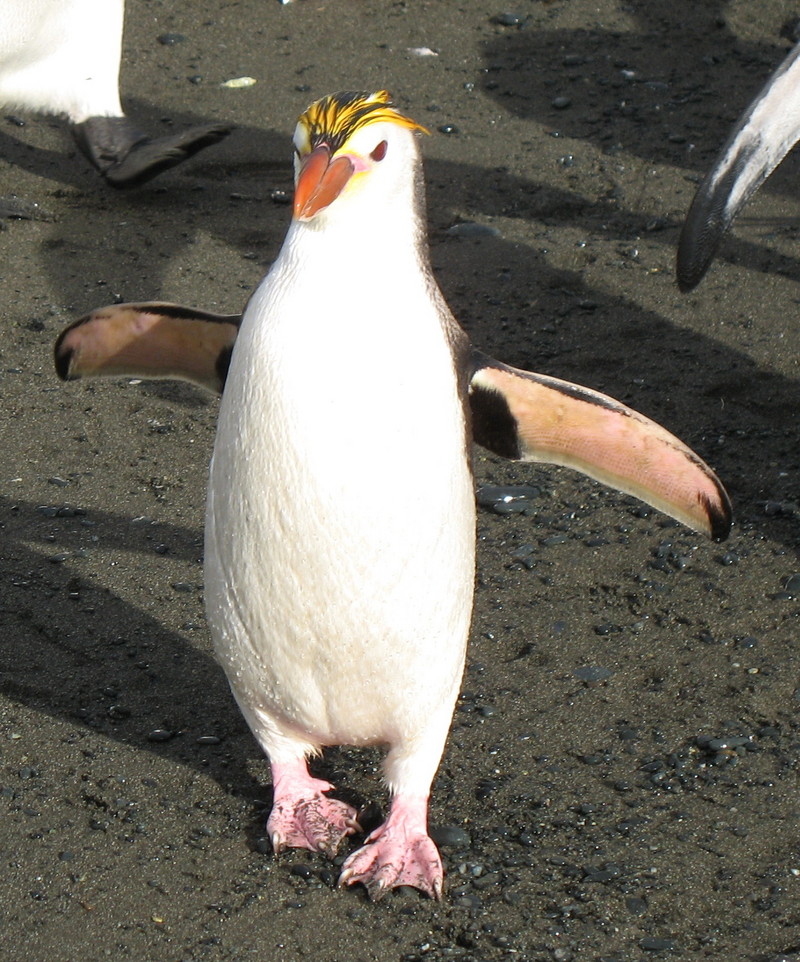Royal Penguin
From Wikipedia, the free encyclopedia
Order: Sphenisciformes
Family: Spheniscidae
[Photo] Photo of a Royal Penguin (Eudyptes schlegeli) on Macquarie Island. Date February 11, 2006. Author M. Murphy. Permission(Reusing this image): Public domain.
The Royal Penguin (Eudyptes schlegeli) inhabits the waters surrounding Antarctica. Royals look very much like Macaroni Penguins, but have a white face and chin instead of the Macaronis' black visage. They are about 70 cm (28 in) long and weigh about 6 kg (13.2 lbs). Royal penguins breed only on Macquarie Island and, like other penguins, spend much of their time at sea, where they are assumed to be pelagic. They are not to be confused with the similar named king penguin or emperor penguin.
There is some controversy over whether Royal penguins are a sub-species of Macaroni penguins. Individuals of the two groups have been known to interbreed, though this is a relatively rare occurrence. Indeed, other penguins have been known to form mixed-species pairs in the wild.
Royal Penguins nest on beaches or on bare areas on slopes covered with vegetation. Like most seabirds they are colonial, nesting in scrapes on the ground up to a mile inland. The breeding season begins in September with laying starting in October. Two eggs are incubated for 35 days, with each incubation stint lasting up to two weeks. After brooding the chick for three weeks, both parents forage at sea while the chicks form large creches. The chicks fledge after two months. Young adults usually return to the colony to breed after six years.
Royal Penguins feed on krill, fish, and small amounts of squid.They build their nest by making a shallow hole in the sand or in a weeded area. They put plants and stones inside the nest. Most of the time, two eggs are often laid, however, only one survives. The egg is kept warm by both parents for 35 days. This is done by rotating 12 day shifts. After hatching, the male watches out for the chick for 10 to 20 days and the female brings food for both of them. Around 20 days, the chicks will form a home for warmth and safety. The parents continue to feed it 2 to 3 times a day. When the chick is about 65 days old it will have its adult feathers and goes on its own.
Royal Penguins are not considered threatened; historically they were harvested for their oil, between 1870 and 1919 the government of Tasmania issuing licences for hunting them, with an average 150,000 penguins (both Royal and King) being taken each year. Since the end of penguin hunting on Macquarie the numbers have climbed to 850,000 pairs.
The scientific name commemorates the German zoologist Hermann Schlegel.
http://en.wikipedia.org/wiki/Royal_Penguin
| The text in this page is based on the copyrighted Wikipedia article shown in above URL. It is used under the GNU Free Documentation License. You may redistribute it, verbatim or modified, providing that you comply with the terms of the GFDL. |
|

